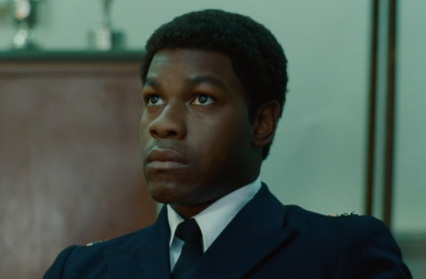Matt Taylor reviews Red, White and Blue, the third film in McQueen’s five-part anthology Small Axe, that shines a spotlight on Black history.

With every week that passes, Small Axe further cements itself as essential viewing for everyone living in the UK in the 21st century. With his third instalment Red, White and Blue, Steve McQueen grapples with the internal politics of the police force in a film that’s as powerful as it is understated, anchored by a career-best turn from star John Boyega.
Boyega portrays Leroy Logan, a research scientist who decides to join the Met after deciding he wants to make a difference in the way the service interacts with people from minority ethnic backgrounds. Though he passes his exams with flying colours, Leroy soon realises that things are stacked against him as he faces adversity both within the force and within his own community – particularly from his father.
It feels like many people have been taking John Boyega for granted in the past few years. His appearances in the recent Star Wars trilogy saw him increasingly pushed to the side – something both viewers and Boyega himself became incredibly frustrated with. Here, however, his acting talent is on full display, and he certainly is a pleasure to watch. His presence is innately amicable: the audience is always able to get along with Leroy because it’s made very clear to us that he’s a good man.
Boyega is stellar in the role; he’s beautifully restrained and professional much of the time, but visibly simmers with rage and a burning desire for change. His outbursts at his racist colleagues are almost unbearably intense, and it becomes very easy for the audience to share Logan’s anger. These interactions with racist officers go to show another of the film’s biggest strengths: that it is unafraid to show the truth.
It should probably be said that Red, White and Blue isn’t particularly a film for the faint of heart. It isn’t excessively violent or bloody, but the way it lays bare the institutional racism inherent in the system is extremely uncomfortable to watch. The racism isn’t just aimed at Leroy, either, and it ranges from little things to large – from a Pakistani officer being asked not to speak Urdu at a crime scene all the way up to racial slurs being hurled at detainees and scrawled on lockers. And it’s this inherent racism that drives both sides of the conflict in the film: between Leroy and his colleagues, and Leroy and his own community.
Black people have always felt unsupported by local police forces – this is not something that many people would dispute. As such, it isn’t so difficult to understand why people take issue with Leroy joining the Met. He’s regularly called a ‘traitor’ and ignored when he tries to speak to people, and his own father struggles to even look him in the eye. This isn’t helped along by the fact that Leroy’s father (played by a superb Steve Toussaint) was assaulted by police officers just weeks before Leroy decide to join. The dynamic between Ken and Leroy is in many ways the film’s real focus, and it is admittedly all the better for it.
It’s becoming increasingly clear that these Small Axe films are not films about racism – not entirely, anyway. Mangrove absolutely is about racism, but it’s also about how people come together in times of crisis; Lovers Rock is less concerned with race than it is with having a good time and portraying Black culture on-screen; and in much the same way, Red, White and Blue’s ultimate focus is not the racism of the Metropolitan Police, but the bond between father and son. Leroy and Ken’s relationship is the true heart of the film, and it’s their dynamic that makes the film’s wonderfully understated ending hit harder than many we’ve seen this year. It’s hard to hold back the tears as it plays out before us: it’s a simple yet beautiful conversation between the two men that is so well-written and well-acted that this one scene alone is worthy of all the awards next year.
The ending feels like a trade-off, in some ways – because as good as it is, it’s hard to shake the feeling that there’s something missing from Red, White and Blue. Clocking in at an extremely lean 80 minutes, there could very easily be more to it. Several plot threads are noticeably left unanswered – but maybe that’s the point. Perhaps we never see Leroy’s racist colleagues get their comeuppance because they never did in real life, and officers such as they are still a part of the police force. Perhaps another 15 minutes could have been spent resolving some of these threads, but in doing so, we’d maybe lose some of what makes the film so fantastic.
And in any case, a few dangling plot strands aren’t enough to undo what makes this movie so excellent. Steve McQueen is yet again in complete control of his craft, and serves up another absolute treat of a film. Red, White and Blue take us past the halfway point of Small Axe, and although it’ll be a shame to see the series wrap up, there’s no denying that these are game-changing films that simply need to be experienced.
Red, White and Blue and the other films that are part of Small Axe are available to stream now on BBC iPlayer.
Matt Taylor is an avid contributor at Wales Arts Review.











